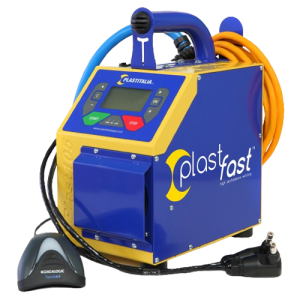When buying an electrofusion welder, it’s crucial to consider several factors to ensure you get a reliable, efficient, and suitable device for your specific needs.
Here are the key aspects to look for:
1. Compatibility and Capacity
Pipe Size Range: Ensure the welder can handle the range of pipe diameters you typically work with.
Material Compatibility: Verify that the welder is suitable for the types of pipes you use, such as HDPE, MDPE, or other thermoplastics.

2. Ease of Use
User Interface: Look for a welder with a clear, easy-to-use interface. Digital displays with intuitive controls can simplify the welding process.
Automatic vs. Manual Operation: Decide whether you need a fully automatic machine that adjusts parameters based on the fitting or a manual one that allows for custom settings.
3. Technical Specifications
Power Supply: Check the voltage and power requirements to ensure compatibility with your work environment. Common voltages are 110V, 220V, or battery-operated models.
Output Current and Voltage: The machine should provide sufficient output for the pipe sizes you work with. Higher output may be necessary for larger pipes.
4. Data Recording and Traceability
Welding Data Logging: A welder with data logging capabilities can record each weld’s parameters, which is useful for quality control and traceability.
Barcode Scanner: Some welders come with barcode scanners to automatically input fitting specifications and ensure accurate welding parameters.
5. Durability and Build Quality
Construction: The welder should be robust and able to withstand the demands of the work environment. Look for units with durable housings and components.
Weather Resistance: If you work outdoors, ensure the welder is weather-resistant or rated for outdoor use.
6. Certification and Compliance
Industry Standards: The welder should comply with relevant industry standards and certifications (e.g., ISO, ASTM, DVS).
Safety Features: Look for built-in safety features such as overheat protection, short-circuit protection, and error alerts.
7. Support and Service
Warranty: Check the warranty period and what it covers.
Technical Support: Ensure the manufacturer or distributor offers reliable technical support and service options.
Training: Some suppliers provide training for using their equipment, which can be valuable for ensuring proper operation.
8. Portability
Weight and Size: Consider the weight and size of the welder, especially if you need to transport it frequently.
Portability Features: Look for features such as carrying handles, compact design, or transport cases.
9. Price and Budget
Cost: Compare prices within your budget range, but don’t compromise on essential features and quality.
Value for Money: Evaluate whether the welder offers good value for the price, considering its features, durability, and the support provided.
10. Reviews and Recommendations
User Feedback: Look for reviews and testimonials from other users in your industry to gauge the reliability and performance of the welder.
Brand Reputation: Consider the reputation of the manufacturer for producing high-quality, reliable welding equipment.
By carefully evaluating these factors, you can choose an electrofusion welder that meets your needs and provides reliable performance for your welding projects.


